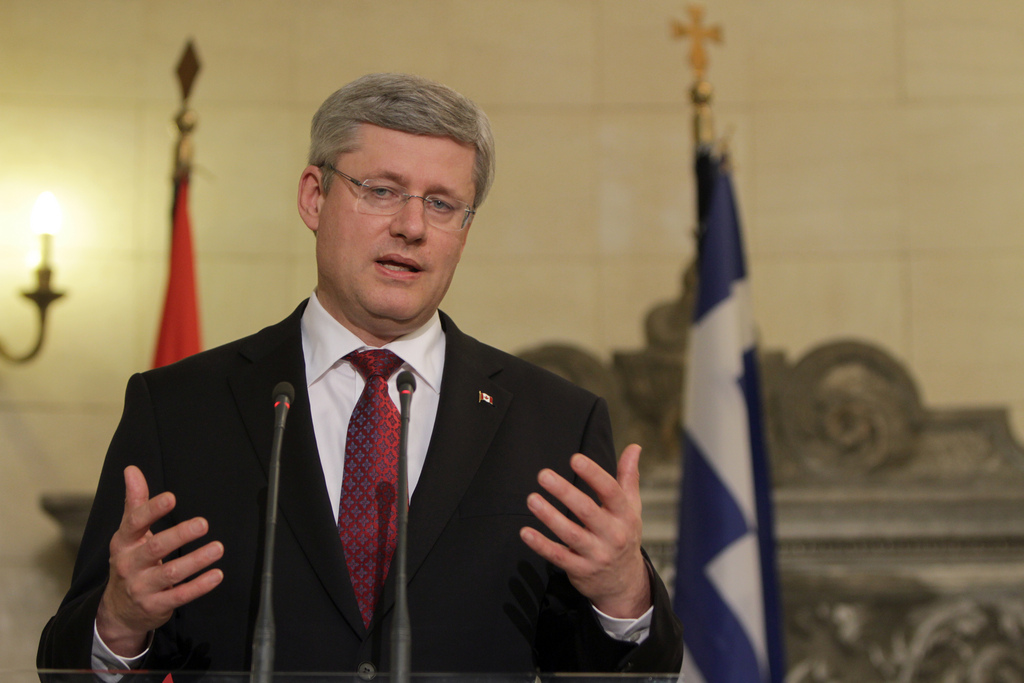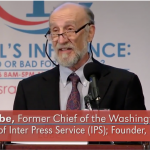by Jim Lobe
Coming up soon in LobeLog, an actual Canadian will analyze the implications for Canada’s Middle East policy of Monday’s victory of the Liberal Party’s Justin Trudeau over Prime Minister Stephen Harper in the parliamentary elections. For now, however, it’s worth noting that Bibi Netanyahu cannot be happy with the results. Without predicting what Trudeau will do, it’s clear that Bibi has just lost a very important international ally in Ottawa and within the Group of Seven (G-7).
Under Harper and his Conservative Party, Canada essentially turned its back on decades of support for multilateralism and the United Nations—the bêtes noires of Netanyahu’s Likud Party and its followers here and in Canada—as well as the country’s relative even-handedness when it came to the Israeli-Palestinian conflict. This has gone largely unnoticed in the United States, where the electorate and the elites tend to take Canada for granted. But it marked a pretty radical reorientation of our neighbor’s post-World War II foreign policy, which had previously been closely tied to that of Western Europe and even the Nordics.
It isn’t just that Harper’s government, particularly during the campaign, resorted to the Islamophobia identified with the European Right. From the outset of his premiership in 2006, Harper aligned himself and his country with the Israeli right. Last May, The Forward described him as “Netanyahu’s fiercest supporter among world leaders” who was “playing up his unstinting support for Netanyahu” in the then-upcoming election campaign.
Among other moves, Harper defunded what his government considered “pro-Palestinian” non-governmental organizations (NGOs), including human rights groups, active in the Occupied Territories. He also phased out Canadian financial contributions (about $30 million a year) to the United Nations Relief and Works Agency for Palestine Refugees in the Near East (UNRWA) between 2009 and 2012. Previously, Canada was one of the beleaguered agency most important donors. Although officially Canada’s position on the illegality of Jewish settlements in the occupied territories remained unchanged, Harper himself consistently avoided criticizing them, an omission which distinguished him from, for example, that most pro-Israeli of U.S. presidents, George W. Bush.
Since Harper came to office, Canada has also consistently defended Israeli military campaigns in Gaza and Lebanon.
In January 2014, Harper became the first Canadian prime minister in history to address the Israeli Knesset, pledging that “through fire and water, Canada will stand with you.” Included in his delegation was a leader of the Canadian arm of the far-right Jewish Defense League (JDL), an organization whose chapters in Israel and the U.S. have been outlawed for terrorist activities.
In a move that baffled many foreign observers, Canada abruptly closed its embassy in Tehran in September 2012 and gave Iran’s diplomats five days to leave the country, calling Iran “the most significant threat to global peace and security in the world today.” As the main reason for the action, Foreign Affairs Minister John Baird cited concerns about the safety of Canadian diplomatic personnel because of an attack by a crowd on the British embassy. That attack, however, had taken place fully 10 months before. (During the just-concluded campaign, Trudeau indicated that he would reopen the embassy.) And although Canada’s most important NATO allies all praised the July 14 Joint Comprehensive Plan of Action between the P5+1 and Iran as a major diplomatic achievement, Harper’s government was downright dour (albeit not quite as negative as Netanyahu):
We appreciate the efforts of the P5+1 to reach an agreement. At the same time, we will continue to judge Iran by its actions not its words…
Iran continues to be a significant threat to international peace and security owing to the regime’s nuclear ambitions, its continuing support for terrorism, its repeated calls for the destruction of Israel, and its disregard for basic human rights.
We will examine this deal further before taking any specific Canadian action.
As of yesterday’s election, Iran still hadn’t endorsed the deal, and Harper’s foreign minister, Rob Nicholson, said last month that Ottawa would not ease its economic sanctions against Tehran for the foreseeable future despite the accord.
Harper also negotiated new provisions for Canada’s free-trade agreement with Israel providing, among other things, duty-free treatment for exports from Jewish settlements in the Occupied Territories. Even more remarkably, a government minister suggested as the election campaign got underway last spring that Ottawa may apply hate-crime laws against any efforts to boycott, divest from, or sanction companies doing business with Israel or its settlements as part of its “zero-tolerance” policy toward the BDS movement.
“In short,” remarked The Times of Israel in its lead editorial Wednesday, “the Harper administration was Prime Minister Benjamin Netanyahu’s dream team.”






Harper is well expelled. I’ve hated him for all too many months. Welcome Trudeau, who, at the least, seems to be reaching out to Muslims. Perhaps he’ll even come to say and mean “Viva Palestine!” (I’m not holding my breath.)
It should be noted that Harper is a flat-earther and true believer who worships at the Church of Crackpot Christianity. Since the first years of his regime, Montreal has filled up with branch offices of America’s fundamentalist churches and organizations. That’s what underpins his devotion to the idea of Greater Israel.
I might point out to Mr. Lobe that “ally” is not a suitable synonym for “bootlick”.
It’s ironic Harper’s party wanted to strip Canadian citizenship from who they considered undesirable, while being vile Quislings themselves.